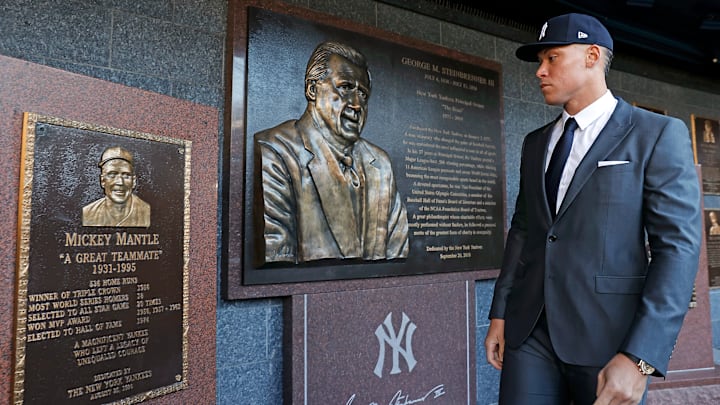Slugger Aaron Judge, after inking a long-term pact with the New York Yankees this past December, was dubbed the 16th captain in the franchise's seemingly eternal history, joining names both iconic and somehow forgotten.
The history of the Yankees' captaincy dates back far longer than you'd think -- and longer than anyone thought before baseball historian Howard W. Rosenberg uncovered new information in 2007. In fact, it goes all the way back to before the team was known as the Yankees; yes, there are a few Highlanders listed here. Back then, the "NY" on the hat wasn't even interlocking.
Judge will officially be in a different stratum when he takes the field for Opening Day on March 30 -- coincidentally against the San Francisco Giants. Hopefully, when he looks at the bunting around the stadium and feels chills, he'll be thinking of these captains who preceded him.
Oh, and he'll vow to win a title or two (or seven) in their names.
Complete List of New York Yankees Captains -- Derek Jeter, Meet Aaron Judge
The Hidden Highlanders: Clark Griffith (1903-1905), Kid Elberfeld (1906-1907), Willie Keeler (1908-1909)
These three players were (relatively) recently uncovered as vintage captains by Rosenberg and the Society for American Baseball Research, and all three hold a significant place in the history of the game.
Griffith, a player-manager with the early Highlanders, was much more famous for managing the Washington Senators (1912-1920) before owning them for 35 additional years. He was elected to the Baseball Hall of Fame in 1946, his time with New York serving as a mere footnote.
Elberfeld was a spitfire shortstop, exactly the kind of person you'd expect to (formally or informally) serve as a captain at the turn of the century. He had the second-highest OPS of any shortstop in baseball (behind Honus Wagner) from 1904 to 1906, but is more famous for going sicko mode on umpire Silk O'Loughlin. He once "menaced" O'Loughlin with a bat when he believed a HBP had been called improperly, then followed that up with a brawl the New York Times called “one of the most disgraceful scenes ever witnessed on a baseball field" on Sept. 3, 1904. He was suspended eight games. Aaron Judge should not do that.
Keeler? He was the famed singles hitter and Hall of Famer behind the aphorism, "Hit 'em where they ain't." Keeler was a turn-of-the-century star, and reinforces the notion that IKF probably could've made Cooperstown if he'd been born in 1872.
More Articles About Aaron Judge:
